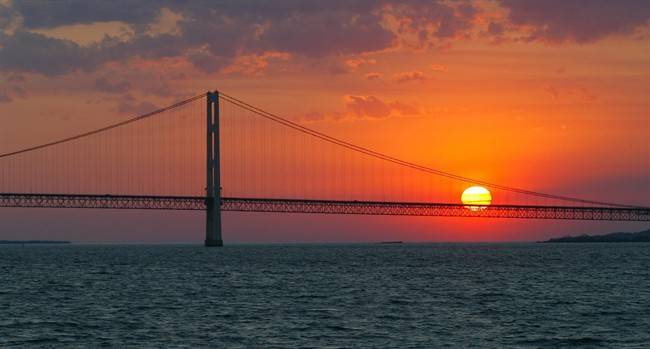A Wisconsin city has been given the green light to draw water from the Great Lakes after eight states approved a precedent-setting request that had raised concerns in Canada and the U.S.

The go-ahead means the city of Waukesha has become the first exception to an agreement banning diversions of water away from the Great Lakes-St. Lawrence River basin.
The city of about 70,000 people asked to divert water from Lake Michigan because its own aquifer is running low and the water is contaminated with high levels of naturally occurring, cancer-causing radium.
READ MORE: Canadians invited to comment on US city’s request to draw Great Lakes water
Critics in Canada and the U.S. warned that the request would set a dangerous example for other communities facing water shortages.
But after making a series of amendments, the representatives of eight states adjoining the Great Lakes – who had final say on the matter after input from Ontario and Quebec- gave Waukesha’s $207-million proposal unanimous approval at a meeting Tuesday.
“There are a lot of emotions and politics surrounding this issue, but voting yes in co-operation with our Great Lakes neighbours is the best way to conserve one of our greatest natural resources,” said Michigan Gov. Rick Snyder. “Mandating strict conditions for withdrawing and returning the water sets a strong precedent for protecting the Great Lakes.”

Get daily National news
Under a current regional agreement between the states and Ontario and Quebec, diversions of water away from the Great Lakes-St. Lawrence River basin are banned, with limited exceptions that can be made only when certain conditions are met.
READ MORE: Groups ask US presidential candidates to support Great Lakes
Waukesha argued that although it’s located outside the boundary of the Great Lakes basin, it is part of a county straddling that geographical line and should be allowed access to the lake’s water. It also promised to return treated water to Lake Michigan.
Ontario, which conducted a review of the plan, expressed concerns about Waukesha’s request and had found that the potential impacts of the diversion on Great Lakes water quantity had not been sufficiently assessed.
“We remain apprehensive about the diversion by Waukesha and will continue to voice the concerns of Ontarians,” Jason Travers, director of the Natural Resources Conservation Policy Branch at Ontario’s Ministry of Natural Resources said Tuesday.
“We also recognize that there is an opportunity to improve the current process by refining existing guidelines.”
READ MORE: Asian carp: Why this invasive species is so dangerous to the Great Lakes
Ontario and Quebec did not get a say in the final vote on Waukesha’s request, but representatives of the two provinces were involved in preliminary approval granted to Waukesha last month, which said the city’s request could comply with the regional agreement if certain conditions were met.
Those conditions included shrinking the size of the area it would provide with Lake Michigan water and limiting the average amount of water it would draw to 31 million litres a day.
Opponents of Waukesha’s plan warned, however, that the city was likely the first of several communities that would seek to become exceptions to the agreement meant to protect the Great Lakes.
“It’s frustrating. A lot of time, effort and money has gone into making our Great Lakes beautiful and preserving the water quality, and this is what can happen in a blink of an eye,” said Mitch Twolan, mayor of Huron-Kinloss, Ont. He is also on the board of directors of the Great Lakes and St. Lawrence Cities Initiative, which represents more than 100 local governments on both sides of the border.
READ MORE: Canadian photographer captures stunning images of Lake Erie’s ‘liquid mountains’
The group had urged the Great Lake state governors to reject Waukesha’s application, saying the city’s amended service area was still too large, the return flow of water to Lake Michigan had not been analysed closely enough, and the approval process dealing with Waukesha’s request has not allowed enough public participation.
A Canadian environmental group, which was also among the opponents of Waukesha’s plan, added that the city did not consider treating the radium in its water supply closely enough.
“Waukesha did not demonstrate clearly that they had assessed that option,” said Keith Brooks, a spokesman for Environmental Defence. “If we start drawing more water from the lakes than can be replenished, then the water levels are going to go down. Ultimately, only a very small amount of this is a renewable resource.”
With files from the Associated Press







Comments